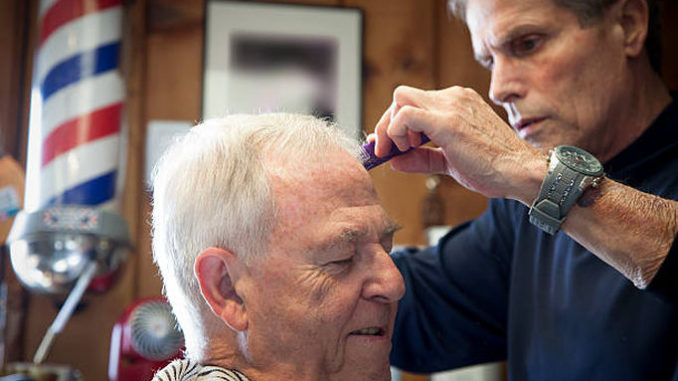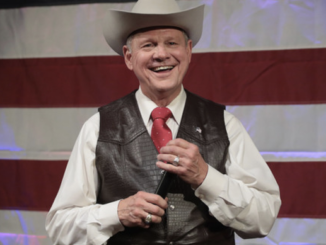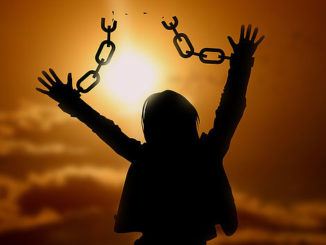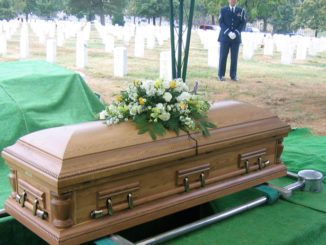
“Today – I want to sing the praises of a true American. A man’s man… and true hero in every town, hamlet, village and city in this country. Today – let’s take a minute and thank – the barber.” –Earl Pitts
For many of us – in particular men – barbering means more than a haircut. It is life lessons, memories, and friendships. But the barbers that we seemingly took for granted are now largely unavailable to my boys and many of yours.
As a boy, I idolized Mr. T from the then popular TV show “The A-Team”. I’ll never forget deciding I just had to have his haircut– a Mohawk. Much to my mother’s dismay, my father agreed. I think the memory of it is traumatic for her still today. She said that she sat in the car and prayed fervently that I would not come out with that haircut.
With Dad leading the way, we entered the barber shop. There were five barbers. The first four refused my request for the Mohawk. The last one said that he had never done one, but agreed to give it a try. My mother learned a difficult lesson that day– God doesn’t always answer our prayers.
As a teenager, I appreciated my barber. He was pleasant to visit with. He was very dependable and could always be counted on for a good haircut. It was a sad day for me when he decided to seek employment elsewhere that was more lucrative. To me, the community hasn’t been the same since he left.
In my college years and beyond, I found a barber whom I loved to visit with. He was a great man; a devoted husband, father, and valuable member of the community. He had a gift for making me feel like we had always known each other. He loved hunting and so did I. I’ll never forget our elk hunting trip together. That is a cherished memory. For us – his clients – his retirement came all too soon.
Those years are now past. My barbers have either moved on to more lucrative employment, retired, or left the state. For many reasons, barbering appears to be a dying industry– a topic that I have discussed on numerous occasions with multiple barbers. In fact, between 1992 and 2012, the number of barber shops declined by 23 percent.
In the early 1900’s, the Gillette Razor Company began producing the “safety razor”. These were the alternative to barber shops for a shave. Then around the time of WWI home hair cutting kits hit the market. This was followed by the 1960’s and hippie culture when hair was longer and visits to the barber were less frequent. All of these factors contributed to the decline of barbering and are discussed in this article. One particular paragraph stuck out to me in the aforementioned article though:
“Even when short hair came back into style during the 1980s, men did not return en masse to the barbershop. Instead, a new type of hairdresser siphoned off the barbers’ former customers: the unisex salon. Places like “SuperCuts” which were neither beauty salons nor barbershops, catered to both men and women. Many states’ licensing boards accelerated this trend by ceasing to issue barber licenses altogether and instead issuing a unisex “cosmetologist” license to all those seeking to enter the hair cutting profession.” (Emphasis Added)
In short, in some state’s government was a contributing factor to the decline of barbering. And while North Dakota still issues licenses to be a “Master Barber” today, I cannot help but wonder if the state’s regulation of the industry is actually impeding the growth of the profession in 2017?
Since 1901, the state has had a “Board of Barber Examiners“. Why? According to the North Dakota Barber’s Association, its purpose is:
“…to provide supervision of the practice of barbering to protect the public health, welfare, and safety. It is responsible for the protection of the public and the barbering profession from unfair and uneconomic practices.”
The process for determining candidates, making appointments to the board, and their length of service is also set by the North Dakota Century Code:
“43-04-04. Board of barber examiners – Appointment – Term of office – Qualifications.
The board of barber examiners must consist of three members, each of whom must be appointed by the governor for a term of three years. The terms of office of the members must be so arranged that one term expires on the thirty-first day of December of each year. Each appointment must be made from a list of five names submitted to the governor by the state barber association, and each member must be a registered barber who has followed the occupation of barber in this state for at least five years prior to that member’s appointment.”
All of these leads me to wonder: Do we really need the state to protect us from unlicensed barbers? Are customers in a truly free market incapable of determining which barber is best suited for them? Is all of this so vitally important that we really need the Governor of North Dakota making appointments to a board of examiners?
Interestingly enough, there was a time when a barber did far more than cut hair or give a shave. As noted on a website about the history of barbering:
“Up until the 18th century the barber-surgeons duties consisted of not only cutting hair and shaving, but picking out lice from hair, pulling rotten teeth, lancing abscesses, setting bone fractures and very often ‘bloodletting’.”
But so far as I know, in 2017 there’s not a barber in the United States that does any of those things beyond cutting hair and shaving. And to be honest, most of the barbers I’ve known won’t even do the shave anymore.
So, why should an individual have to be licensed by the state to cut hair? I see absolutely no legitimate reason that the government should have anything to do with such a thing. The market is perfectly capable of handling it. After all, how long do you suppose a person will last if they flat out give a bad haircut? I’m guessing not long.
The Century Code defines barbering:
“…’barbering’ includes any one or any combination of the following practices when done upon the upper part of the human body for cosmetic purposes and not for the treatment of diseases or physical or mental ailments, and when done for payment either directly or indirectly:
a. Shaving or trimming the beard or cutting the hair.
b. Giving facial or scalp massages or treatments with oils, creams, lotions, or other preparations either by hand or mechanical appliances.
c. Singeing, shampooing, or dyeing the hair or applying hair tonics.
d. Applying cosmetic preparations, antiseptics, powders, oils, clays, or lotions to scalp, face, neck, or upper part of the body.”
(Emphasis Added)
So, what about all those “home haircuts”? When was the last time that you heard of some horrific public health crisis because of those? And what’s the difference between an individual doing any of the things listed above for all their family, friends, or acquaintances and a licensed barber doing it?
It’s actually very simple. Aside from the argument about training or quality, the only difference would be money. So, that leads us to another issue– protectionism. Is one of the contributing factors to the decline in barbers the barbering industry itself?
Until recently, there was an apprenticeship requirement in the State of North Dakota. Those completing the state-mandated 1,550 hours of instruction at a school approved by the board were required to apprentice for a year under a registered barber.
Prior to the apprenticeship requirement being dropped, I spoke with a barber that served on the board. This person indicated to me at the time that they were considering dropping the requirement in hopes of attracting more people to the profession– a sensible move in my opinion.
I recently returned to the shop where I got my Mohawk as a boy. The barber I visited with – who is also the owner of the shop – didn’t like the change. Why? “Because now these graduates can just go start their own shops right out of school.” A moment of honesty on his part.
You see, he’s afraid of the competition. Again, it’s about protectionism– a practice common in other industries as well. But what I don’t think this man realizes is that protectionism and regulation may also be a contributing factor to the fact that four of his five chairs are now empty.
Instead of having the state involved at all – and instead of engaging in protectionism – I believe the barbering industry should advocate for removing the state from having anything to do with them at all. Let the market be the sole regulator of the industry.
Under such circumstances, barbers would then be free to recruit and train those who have no interest in attending an “approved school” in addition to those that are. A move that could actually benefit the barber who opposed dropping the apprenticeship requirement.
If you think such an idea is unheard of, it’s not. In the 1970’s, Alabama was reported to be the only state without a licensing requirement for barbers. But in 1973 the Alabama legislature decided to go along with the crowd and they passed a licensing law similar to what North Dakota has today.
The result? In spite of a grandfathering clause, the number of barbers in Alabama sharply declined. The requirements were then dropped in 1983. Unfortunately, the cycle has come full circle and licensure requirements have once again been implemented as of 2013. Some politicians just never learn.
This is, of course, just one example of many industries where both the industry itself and its customers would benefit from deregulation and the elimination of protectionism.
To me, it is clear– if we want to help save the American tradition of barbering, then we should trim the government.
Sources:
1. http://www.ndbarbers.org/accreditation.htm
2. http://www.legis.nd.gov/cencode/t43c04.pdf
3. http://www.artofmanliness.com/2008/05/20/rediscovering-the-barbershop/
4. https://earlpittsamerican.com/american-barber/
5. http://www.trimtimes.com/history-of-barbering/
6. https://www.barber-license.com/north-dakota/
7. https://www.bls.gov/opub/mlr/2015/article/the-de-licensing-of-occupations-in-the-united-states.htm 8. https://www.wpr.org/decline-barbershop-and-rise-mens-salon





